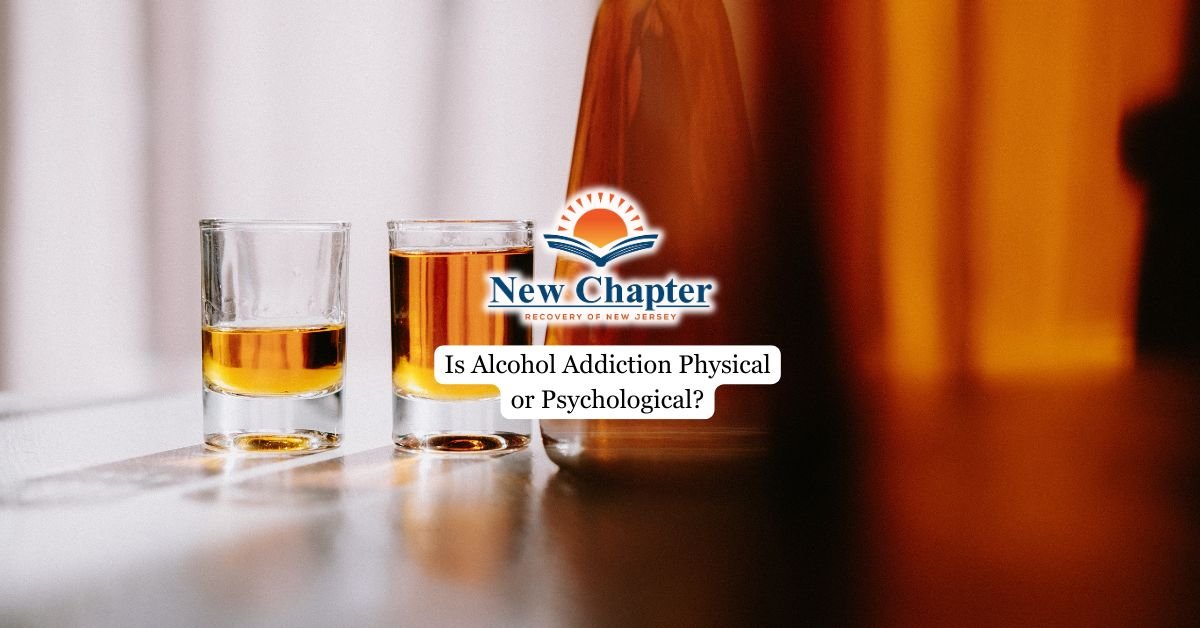Alcohol addiction is a complex condition involving both physical and psychological factors. Understanding whether it’s driven by body chemistry, mental reliance, or a combination of both is crucial for effective treatment and lasting recovery.
This article explores the physical and emotional aspects of dependence to help individuals and families recognize the full scope of the problem and the importance of comprehensive care.

The Physical Nature of Alcoholism
Physical dependence occurs when the body becomes accustomed to regular drinking. Over time, a person may develop tolerance, meaning they need to consume more to feel the same effects. This adaptation leads to withdrawal symptoms when consumption is reduced or stopped suddenly. These symptoms can range from sweating, tremors, and nausea to more severe reactions such as seizures and delirium tremens.
Chronic alcohol use alters brain chemistry by affecting neurotransmitters responsible for regulating mood, sleep, and cognition. As the brain adjusts to its constant presence, it becomes reliant on it to function normally. When someone who is physically dependent attempts to stop drinking, the body reacts strongly, a defining feature of physical addiction.
Medical professionals recognize withdrawal as a serious condition. Detox is often required to manage the process safely, particularly in those who are severely dependent. The physical effects of this dependency are also documented in the Statistical Manual of Mental Disorders, which outlines criteria for diagnosing alcohol use disorder.
The Psychological Side of Alcohol Addiction
Psychological dependence involves the emotional and mental reliance on drinking to cope with stress, trauma, or other underlying mental health issues. People who turn to liquor or other alcoholic drinks to escape anxiety, depression, or unresolved psychological pain often develop a strong mental addiction. Over time, the brain forms associations between drinking and emotional relief, reinforcing the urge to consume during moments of distress.
Physical symptoms do not always accompany psychological reliance, but the internal craving can be just as powerful. Individuals may feel they cannot function without a drink or may turn to it habitually to manage emotions. This form of dependency often stems from long-standing psychological patterns, making it difficult to break the cycle of addiction.
Mental health problems such as anxiety disorders, PTSD, and depression frequently co-occur with alcohol use disorder. As a result, addiction treatment must address both the psychological aspects of substance use and any underlying mental health conditions to be effective.
Distinguishing Between Psychological and Physical Dependence
Physical dependence is marked by physiological changes and withdrawal symptoms when drinking stops. In contrast, psychological dependence is driven by emotional triggers and mental health issues that compel a person to keep consuming.
Some individuals may experience both forms of dependence simultaneously, complicating their ability to stop. Others may not face severe physical symptoms but are deeply emotionally tied to their drinking habits. Recognizing whether someone is physically or psychologically dependent or both helps professionals tailor the right approach to treatment.
The craving can be rooted in the body’s need to avoid withdrawal or the mind’s need to escape emotional discomfort. In either case, dependence can lead to compulsive drinking and a long-term struggle despite adverse consequences.
Individual Vulnerability and Risk Factors
Not everyone who engages in drinking becomes addicted. Various factors influence a person’s likelihood of developing dependency. Genetics, mental health conditions, early exposure to alcohol, and environmental stressors all play a role in the development of substance addiction.
People with alcohol misuse in the family may be more prone to developing dependence. Those with untreated mental health issues are also more likely to rely on drinking as a coping mechanism. Heavy consumption, especially over a prolonged period, increases the risk of both physical and psychological dependence.
Addiction is a chronic condition, and once an individual begins to rely on this substance, the cycle can become deeply ingrained. The longer someone continues to drink despite negative consequences, the harder it becomes to break free from the behavior.

Understanding Alcohol Use Disorder (AUD)
AUD is the clinical term used to diagnose individuals who have a problematic pattern of excessive drinking. According to the National Institute on Alcohol Abuse and Alcoholism, AUD includes a range of symptoms related to both psychological and physical dependence. These include an inability to control drinking liquor, continued use despite health problems, and the presence of alcohol withdrawal symptoms when not drinking.
AUD captures the full scope of addiction to alcohol, from mild misuse to severe alcoholism. It also accounts for mental and emotional symptoms, such as using alcohol to feel normal or to relieve anxiety.
Treatment That Addresses Both Sides of Addiction
Effective addiction treatment must target both the physical and psychological dimensions of alcohol addiction. For those who are physically dependent on alcohol, medical supervision during alcohol detox is necessary to manage severe withdrawal symptoms and reduce health risks.
However, treating physical symptoms alone is not enough. Long-term recovery depends on addressing psychological dependence, which may involve therapy, counseling, and support groups. Rehab programs often combine detoxification with behavioral therapies designed to treat the mental health aspects of addiction.
Effective treatment involves managing both physical withdrawal and psychological reliance. Our specialized Alcohol Addiction Treatment program at New Chapter Recovery provides medically supervised detox, personalized therapies, and ongoing support designed to help you or your loved one achieve lasting recovery.
People who have developed this dependency need tools to manage emotional triggers and build healthier coping mechanisms. Addressing the psychological effects of drinking, including its impact on the brain and emotional regulation, is essential for relapse prevention and long-term recovery.
Final Thoughts from New Chapter Recovery
Alcohol addiction is both physical and psychological, involving brain chemistry, emotional dependence, and behavioral patterns. At New Chapter Recovery in New Jersey, we understand this dual nature and offer comprehensive outpatient programs that address the full spectrum of dependence. Our evidence-based therapies and twelve-step approach are designed to support lasting recovery while allowing clients to maintain their daily responsibilities. We tailor each treatment plan to the individual—mind, body, and spirit—to ensure meaningful, sustainable healing.






